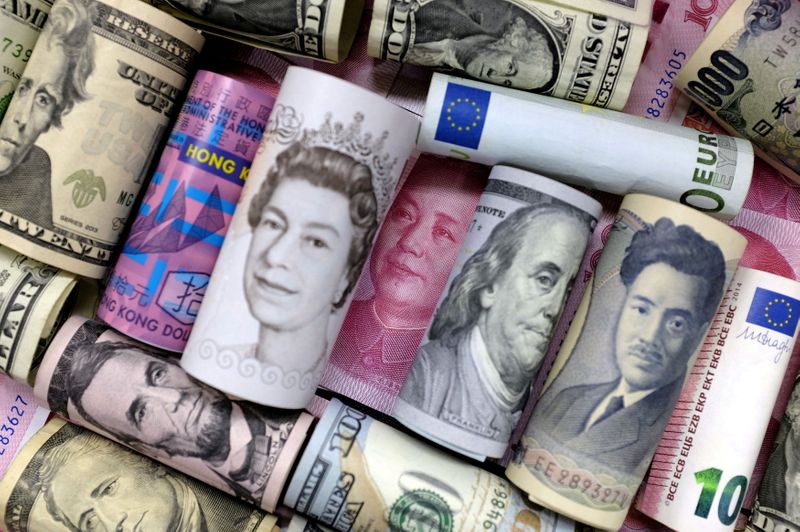By Anushka Trivedi
(Reuters) - Investors raised short bets on most Asian emerging currencies, a fortnightly Reuters poll found, as a slew of factors including U.S. rate-hike expectations, rising inflation and signs of slowing global economic growth boosted the dollar.
Long positions on the Singapore dollar, Taiwan's dollar and the Indian rupee were reversed, while bearish views on the South Korean won hit a two-year peak, the poll of 12 respondents showed.
The Indonesian rupiah was the only currency with a bullish trend, although long bets were almost halved.
The safe-haven greenback has risen to a one-year high since the Federal Reserve's hawkish tilt two weeks ago led markets to price in a rate hike sometime in 2022, with sharp gains in benchmark Treasury yields adding to its appeal.
The dollar is expected to dominate the currency markets for another year as inflation concerns come to the fore, with surging energy prices amid a supply crunch threatening global economic growth.
Asia's economic prospects have already been marred by China's slowdown, supply chain bottlenecks and lingering effects of devastating COVID-19 waves in trade-reliant countries like Singapore, Thailand and the Philippines.
However, bets on the yuan barely changed as the currency remained resilient despite a debt crisis at property giant China Evergrande, which HSBC partly attributed to the onshore market's hope for a policy fine-tuning by the Chinese central bank.
Crude prices testing $80 per barrel prompted investors to turn bearish on the rupee for the first time since mid-August, as India is the world's third-biggest oil consumer. The rupee has been the most heavily sold currency in Asia since the Fed meeting.
Graphic: Asia EM FX since Fed - https://fingfx.thomsonreuters.com/gfx/mkt/byprjlznjpe/EM%20asia%20with%20oil.PNG
Analysts at Barclays (LON:BARC) said a recent slowdown in foreign fund flows into Indian equities seemed to be compensated by a pick-up in bonds as the economy's growth trajectory was intact and would keep the rupee from breaching the 75.0 per dollar mark.
Taiwan and South Korea's currencies have depreciated in tandem with a sell-off in local bourses dominated by tech stocks, which are sensitive to inflation. They have faced outflows of $2.13 billion and $762 million, respectively, so far this month.
Meanwhile, investors preferred the rupiah more among Asian currencies as higher commodity prices and a large trade surplus were seen putting a floor under the risky currency, Barclays analysts said.
The Asian currency positioning poll is focused on what analysts and fund managers believe are the current market positions in nine Asian emerging market currencies: the Chinese yuan, South Korean won, Singapore dollar, Indonesian rupiah, Taiwan dollar, Indian rupee, Philippine peso, Malaysian ringgit and the Thai baht.

The poll uses estimates of net long or short positions on a scale of minus 3 to plus 3. A score of plus 3 indicates the market is significantly long U.S. dollars.
The figures include positions held through non-deliverable forwards (NDFs).